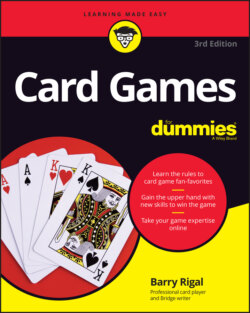Читать книгу Card Games For Dummies - Barry Rigal - Страница 52
KIDS AND CARD GAMES
ОглавлениеThese days, most children seem to be born with a remote or video-game controller in their hands. However, some children are lucky enough to receive decks of cards when they’re young (as was the case with me).
Teaching children how to play cards is fun — both for them and for you! Children get an opportunity to interact with others, revel in the challenge of a game, and enjoy a sense of mastery. Card games also foster a strong sense of belonging and a connection to the family or social group.
In a more tangible sense, card games can enhance a child’s skills. To play card games, children must master rules, develop mental strategies, understand objectives, evaluate their (and their opponents’) strengths and weaknesses, and make plans. The games also force them to respond quickly and to deal socially with others.
Some studies suggest that card players develop better problem-solving and lateral-thinking skills (the ability to “think outside the box”). Developing competence in one field can improve a child’s self-confidence to learn in other areas. Therefore, cards can increase a child’s scores in math and critical thinking, as well as improve their social skills.
Finally, card games — like other cognitively engaging activities, including chess, backgammon, and crossword puzzles — are being cited as excellent activities for keeping the brain supple and engaged throughout life, potentially delaying the onset of Alzheimer's disease and other memory disabilities.
